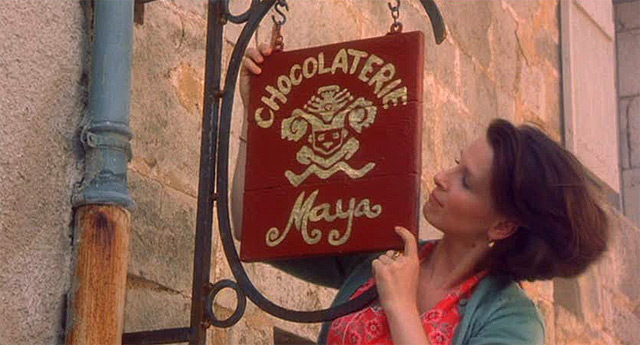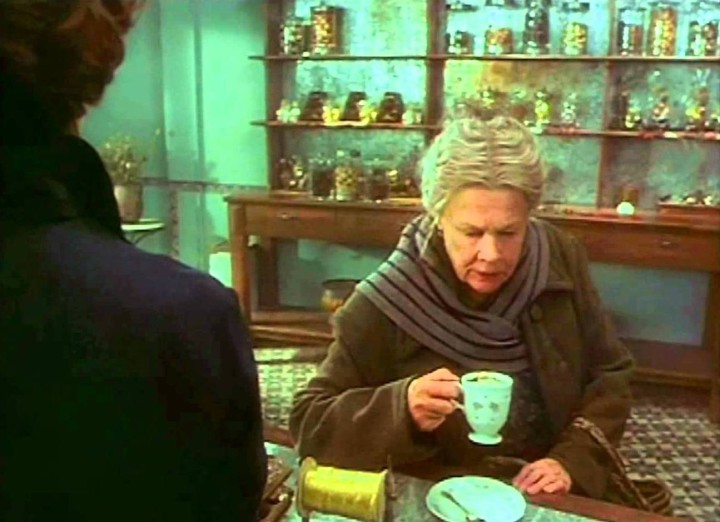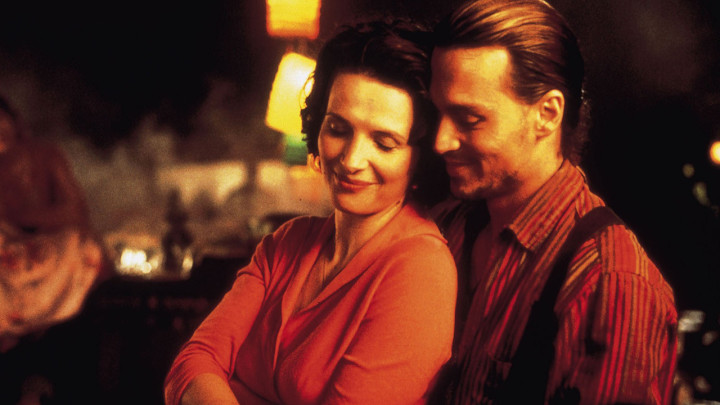Here is the original review from 2001 (now with actual paragraphs, which we didn’t have at the time): Charm is a delicate and usually very elusive thing — never more so than in the movies. Take it even slightly too far, and instead of the souffle attempted, the results are more like five pounds of sodden, indigestible Christmas fruitcake. However, director Lasse Hallstrom and screenwriter Robert Nelson Jacobs have completely succeeded with Chocolat, an almost impossibly charming little fantasy. The film details what happens to the inhabitants of a small French village when a mysterious — and morally “incorrect” — woman, Vianne Rocher (Juliette Binoche), and her brazenly illegitimate daughter, Anouk (Victoire Thivisol), fly in the face of convention (and business sense) by opening a chocolate shop there during Lent.
Basically, it’s a very old premise — the colorful outsider who brings life to a drab town — but in Chocolat, the theme is given new life, easily as bright as the red hooded cloaks in which our heroines arrive on the scene. Here is a film that knows both when to play to our expectations and when to delightfully surprise us. We know, for example, that Vianne’s effect on the village will ultimately be a miraculous transformation. If the film did not offer us that, we would be disappointed. We can fairly easily chart the various changes that will occur among the inhabitants along the way. Again, the film does not disappoint. In that respect, Chocolat gives us what we expect and want, and makes it all seem real and moving and fresh by the sheer creativity of the direction (there is not an ill-timed shot or a misjudged angle in the film) and the personalities of its characters. Then the film turns around and adds another layer to the standard myth by having the village and the people Vianne changed make an equal change in her. It all sounds far more simple than it is, and much of what is so special about Chocolat does not lend itself to analysis. In fact, deeply analyzing something this charmingly fragile might kill it.
Of course, a film of this type is utterly reliant on the skills of the actors, and Hallstrom has assembled what can only be called a dream cast. In addition to Binoche and Thivisol (who are both just right), the film offers positively luminous turns — often against type — from Lena Olin, Judi Dench, Carrie-Anne Moss, Alfred Molina, the legendary Leslie Caron, and last but far from least, Johnny Depp. Depp, who appeared earlier in Hallstrom’s quirky What’s Eating Gilbert Grape? perhaps came onboard as a favor to the director. More likely, this glorified supporting role was simply another of his unorthodox and constantly surprising career choices. Once again, Depp proves that he can do just about anything — even accept a small role; sport a believable Irish accent (though what a character named Roux is doing with an Irish accent is another matter, but the name is probably more symbolic than anything); and leave an indelible mark on a film that isn’t really his. At bottom, Chocolat is a beguiling little fable — and a perfect film for anyone who ever needed an imaginary kangaroo playmate to help them get by. See this wonderful movie and you’ll understand what I mean.
Classic World Cinema by Courtyard Gallery will present Chocolat Friday, June 5, at 8 p.m. at Phil Mechanic Studios, 109 Roberts St., River Arts District (upstairs in the Railroad Library). Info: 273-3332, www.ashevillecourtyard.com







” I am forced to admit that the film hasn’t quite retained its original magic over the space of 14 years. Its luster seems to me to have ever-so-slightly dimmed, but only slightly.”
A lot happens in the space of 14 years. Possibly we lose some of our ability to believe in the magic explored in this lovely film after being so long on the planet.
Note. Using “we ” here. This is not meant to incite. Just a thought.
It is, of course, impossible to say whether the film is at the heart of this observation, or if the change is in me. Considering you refer to “the magic explored in this lovely film,” I’m assuming you think it’s as fresh today as it was in 2001, and that I have changed, not the film. In a sense, that’s true since the film hasn’t physically changed. But our perception does and should be allowed to change. Whether you perceive that as souring with age — I’m guessing that’s your point — or merely reassessing is a hard or impossible call. Certainly I can’t tell you. But do you retain your original enthusiasm for every movie you see? Do you never see something later on and think you perhaps overrated it? Alternatively, do you never see something later and realize that it’s better than you thought when you first encountered it? Two sides of the same coin. Hell, it took me 42 years to like 2001. After reading about it for years, I finally saw Rene Clair’s Le Million (1930) about 1990, and I thought it was darn near unwatchable. I tried it again about 10 years later and, for whatever reason, I found it absolutely delightful. I suspect that was a combination of just not being receptive to it 1990, and the fact that it just wasn’t the film I’d imagined it to be from reading about it for 20 years. When I came to it later, I knew what it was and, more importantly, what it wasn’t.
It’s hard to say that you weren’t in just the right frame of mind to be enchanted by something when you first saw it. For example, I was in a very bad place when I saw Mark Waters’ remake of Freaky Friday — the Lindsay Lohan film — in 2003. In fact, I wrote at the time, “I walked into Freaky Friday in a truly vile frame of mind — preoccupied with all sorts of issues not related to the movie and stressed-out to an alarming degree. At film’s end, no, all my troubles hadn’t vanished (nothing so miraculous as that), but I realized I had not thought about them at all for 90-odd minutes. I had completely escaped into the fantasy and comedy laid out before me by director Mark S. Waters and his two stars. Now, any movie that can do that is doing something very right indeed.” Have I revisited the movie? No, and I have no special desire to. In fact, it would probably be ill-advised. Granted, a remake of a fairly lousy 1976 Disney comedy is not in the same league as Chocolat, but the dynamic is the same.